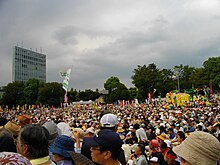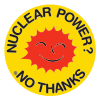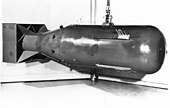
Back حركة مناهضة للأسلحة النووية Arabic Movimientu antinuclear AST Moviment antinuclear Catalan Kontraŭatomenergia movado Esperanto Movimiento antinuclear Spanish Tuumavastane liikumine Estonian Mugimendu antinuklear Basque جنبش ضدهستهای Persian Mouvement antinucléaire French Movemento antinuclear Galician



| Anti-nuclear movement |
|---|
 |
| By country |
| Lists |
| Nuclear weapons |
|---|
 |
| Background |
| Nuclear-armed states |
|
The anti-nuclear movement is a social movement that opposes various nuclear technologies. Some direct action groups, environmental movements, and professional organisations have identified themselves with the movement at the local, national, or international level.[2][3] Major anti-nuclear groups include Campaign for Nuclear Disarmament, Friends of the Earth, Greenpeace, International Physicians for the Prevention of Nuclear War, Peace Action, Seneca Women's Encampment for a Future of Peace and Justice and the Nuclear Information and Resource Service. The initial objective of the movement was nuclear disarmament, though since the late 1960s opposition has included the use of nuclear power. Many anti-nuclear groups oppose both nuclear power and nuclear weapons. The formation of green parties in the 1970s and 1980s was often a direct result of anti-nuclear politics.[4]
Scientists and diplomats have debated nuclear weapons policy since before the atomic bombings of Hiroshima and Nagasaki in 1945.[5] The public became concerned about nuclear weapons testing from about 1954, following extensive nuclear testing. In 1963, many countries ratified the Partial Test Ban Treaty which prohibited atmospheric nuclear testing.[6]
Some local opposition to nuclear power emerged in the early 1960s,[7] and in the late 1960s some members of the scientific community began to express their concerns.[8] In the early 1970s, there were large protests about a proposed nuclear power plant in Wyhl, West Germany. The project was cancelled in 1975 and anti-nuclear success at Wyhl inspired opposition to nuclear power in other parts of Europe and North America.[9][10] Nuclear power became an issue of major public protest in the 1970s[11] and while opposition to nuclear power continues, increasing public support for nuclear power has re-emerged over the last decade in light of growing awareness of global warming and renewed interest in all types of clean energy (see the Pro-nuclear movement).
A protest against nuclear power occurred in July 1977 in Bilbao, Spain, with up to 200,000 people in attendance. Following the Three Mile Island accident in 1979, an anti-nuclear protest was held in New York City, involving 200,000 people. In 1981, Germany's largest anti-nuclear power demonstration took place to protest against the Brokdorf Nuclear Power Plant west of Hamburg; some 100,000 people came face to face with 10,000 police officers. The largest protest was held on 12 June 1982, when one million people demonstrated in New York City against nuclear weapons. A 1983 nuclear weapons protest in West Berlin had about 600,000 participants. In May 1986, following the Chernobyl disaster, an estimated 150,000 to 200,000 people marched in Rome to protest against the Italian nuclear program. In Australia unions, peace activists and environmentalists opposed uranium mining from the 1970s onwards and rallies bringing together hundreds of thousands of people to oppose nuclear weapons peaked in the mid- 1980s.[12] In the US, public opposition preceded the shutdown of the Shoreham, Yankee Rowe, Millstone 1, Rancho Seco, Maine Yankee, and many other nuclear power plants.
For many years after the 1986 Chernobyl disaster, nuclear power was off the policy agenda in most countries, and the anti-nuclear power movement seemed to have won its case, so some anti-nuclear groups disbanded. In the 2000s, however, following public relations activities by the nuclear industry,[13][14][15][16][17] advances in nuclear reactor designs, and concerns about climate change, nuclear power issues came back into energy policy discussions in some countries. The 2011 Fukushima nuclear accident subsequently undermined the nuclear power industry's proposed renaissance and revived nuclear opposition worldwide, putting governments on the defensive.[18] As of 2016, countries such as Australia, Austria, Denmark, Greece, Malaysia, New Zealand, and Norway have no nuclear power stations and remain opposed to nuclear power.[19][20] Germany, Italy, Spain, and Switzerland are phasing-out nuclear power. Sweden formerly had a nuclear phase-out policy, aiming to end nuclear power generation in Sweden by 2010. On 5 February 2009, the Government of Sweden announced an agreement allowing for the replacement of existing reactors, effectively ending the phase-out policy.[20][21][22] Globally, the number of operable reactors remains nearly the same over the last 30 years, and nuclear electricity production is steadily growing after the Fukushima disaster.[23]
- ^ Cite error: The named reference
Kitschelt1986was invoked but never defined (see the help page). - ^ Fox Butterfield. Professional Groups Flocking to Antinuclear Drive Archived 24 June 2020 at the Wayback Machine, The New York Times, 27 March 1982.
- ^ Gamson, William A.; Modigliani, Andre (July 1989). "Media Discourse and Public Opinion on Nuclear Power: A Constructionist Approach". American Journal of Sociology. 95 (1): 1–37. doi:10.1086/229213. JSTOR 2780405. S2CID 144232602.
- ^ John Barry and E. Gene Frankland, International Encyclopedia of Environmental Politics, 2001, p. 24.
- ^ Cite error: The named reference
browwas invoked but never defined (see the help page). - ^ Cite error: The named reference
rudig2was invoked but never defined (see the help page). - ^ Garb Paula (1999). "Review of Critical Masses". Journal of Political Ecology. 6. Archived from the original on 1 June 2018. Retrieved 6 January 2010.
- ^ Cite error: The named reference
rudigwas invoked but never defined (see the help page). - ^ Cite error: The named reference
pubwas invoked but never defined (see the help page). - ^ Cite error: The named reference
gotwas invoked but never defined (see the help page). - ^ Jim Falk (1982). Global Fission: The Battle Over Nuclear Power, Oxford University Press, pp. 95–96.
- ^ Kearns, Barbara (5 May 2021). "Stepping Out For Peace: A History of CANE and PND (WA)". The Commons Social Change Library. Archived from the original on 27 January 2023. Retrieved 3 March 2023.
- ^ Leo Hickman (28 November 2012). "Nuclear lobbyists wined and dined senior civil servants, documents show". The Guardian. Archived from the original on 28 November 2021. Retrieved 11 December 2016.
- ^ Farseta, Diane (1 September 2008). "The Campaign to Sell Nuclear". Bulletin of the Atomic Scientists. pp. 38–56. Archived from the original on 19 September 2020. Retrieved 19 September 2021.
- ^ Jonathan Leake. "The Nuclear Charm Offensive" New Statesman, 23 May 2005.
- ^ Union of Concerned Scientists. Nuclear Industry Spent Hundreds of Millions of Dollars Over the Last Decade to Sell Public, Congress on New Reactors, New Investigation Finds Archived 27 November 2013 at the Wayback Machine News Center, 1 February 2010.
- ^ Nuclear group spent $460,000 lobbying in 4Q Archived 23 October 2012 at the Wayback Machine Business Week, 19 March 2010.
- ^ "Japan crisis rouses anti-nuclear passions globally". The Washington Post. 16 March 2011. Archived from the original on 18 January 2012.
- ^ "Nuclear power: When the steam clears". The Economist. 24 March 2011. Archived from the original on 19 April 2023. Retrieved 7 June 2011.
- ^ a b Duroyan Fertl (5 June 2011). "Germany: Nuclear power to be phased out by 2022". Green Left. Archived from the original on 1 November 2022. Retrieved 7 June 2011.
- ^ Erika Simpson and Ian Fairlie, Dealing with nuclear waste is so difficult that phasing out nuclear power would be the best option Archived 15 May 2021 at the Wayback Machine, Lfpress, 26 February 2016.
- ^ James Kanter (25 May 2011). "Switzerland Decides on Nuclear Phase-Out". The New York Times. Archived from the original on 9 October 2021. Retrieved 5 February 2017.
- ^ "Nuclear Power Today | Nuclear Energy - World Nuclear Association". world-nuclear.org. Archived from the original on 1 December 2021. Retrieved 15 August 2021.